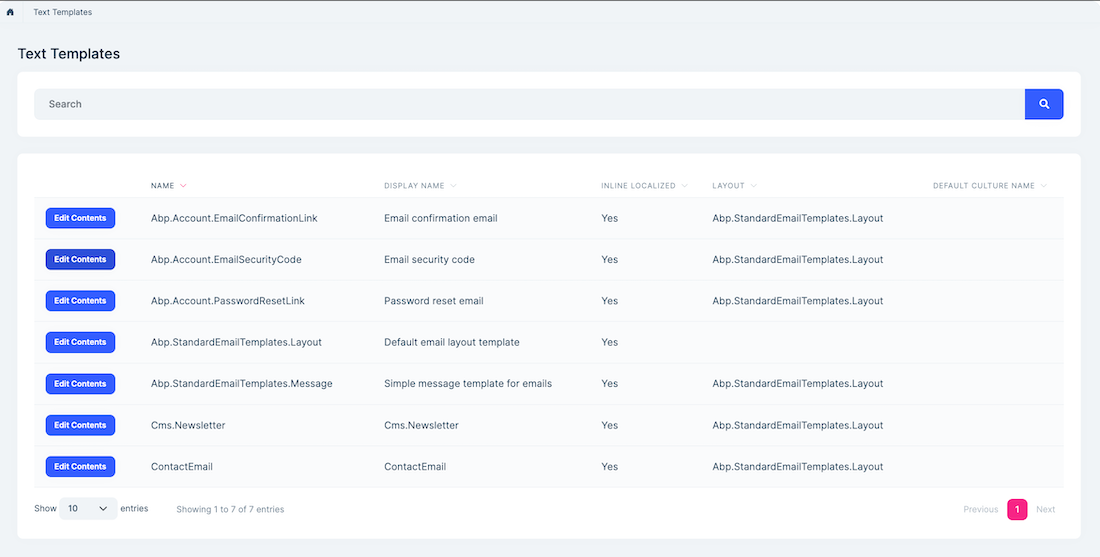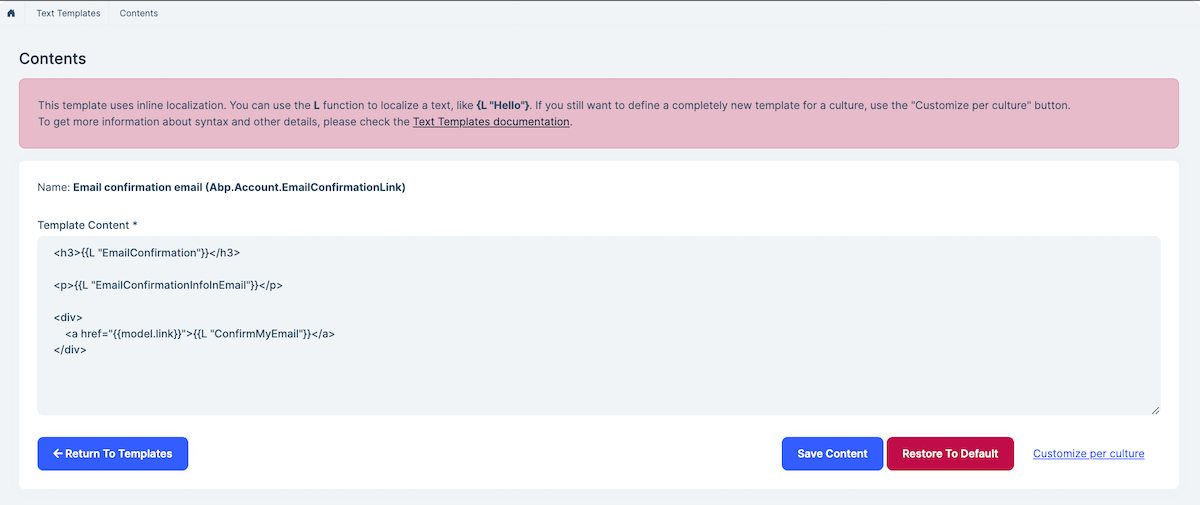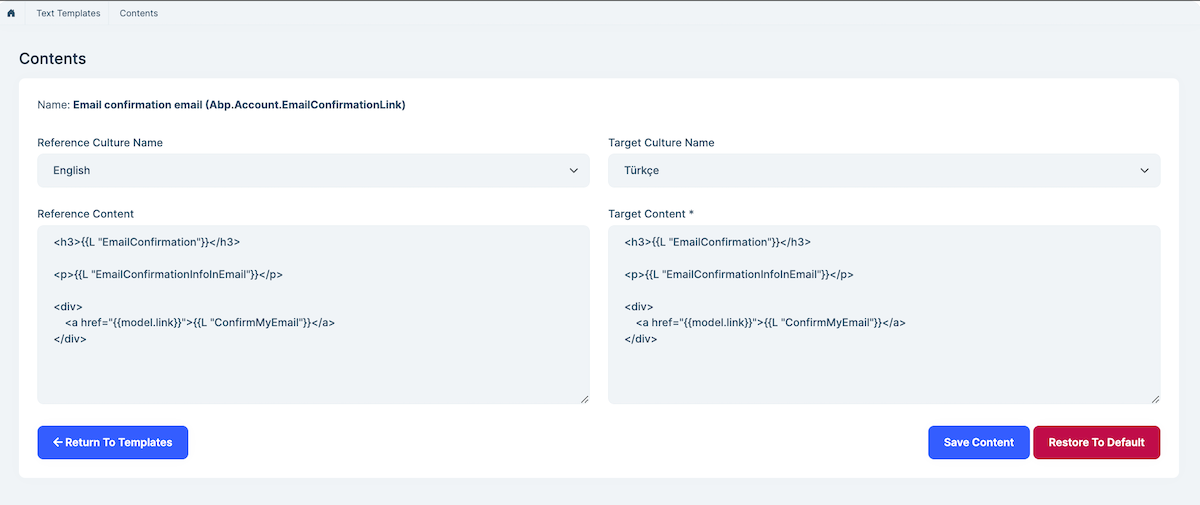Text Template Management Module
This module is used to store and edit template contents for the text templating system of the ABP framework. So, you may need to understand it to better understand the purpose of this module.
There are different use cases of the text templating system. For example, the Account Module is using it to define templates for sending emails when it needs to send emails to users (like sending "password reset link" email). This module provides UI to easily edit these email templates.
See the module description page for an overview of the module features.
How to Install
Text Template Management module is pre-installed in the startup templates. So, no need to manually install it.
Existing Solutions
If you want to add the Text Template Management module to your existing solution, you can use the ABP CLI add-module command:
abp add-module Volo.TextTemplateManagement
Packages
This module follows the module development best practices guide and consists of several NuGet and NPM packages. See the guide if you want to understand the packages and relations between them.
You can visit Text Template Management module package list page to see list of packages related with this module.
User Interface
Menu Items
Text Template Management module adds the following items to the "Main" menu, under the "Administration" menu item:
- Text Templates: List, view and filter text templates.
TextTemplateManagementMainMenuNames class has the constants for the menu item names.
Pages
Text Templates
Text Templates page is used to view the list of templates defined in the application.

Click to the Actions -> Edit Contents to edit content for a template. There are two types of UI to edit a template content:
Editing Content for Inline Localized Templates
This kind of templates uses the L function to perform inline localization. In this way, it is easier to manage the template for different cultures.

Editing Contents for Culture-Specific Templates
This kind of templates provides different content for each culture. In this way, you can define a completely different content for a specific culture.

Configure TextTemplateManagementOptions
TextTemplateManagementOptions can be used to configure the module. You can use the below code to configure it in the ConfigureServices method of your module (eg: BookStoreApplicationModule).
Configure<TextTemplateManagementOptions>(options =>
{
options.MinimumCacheDuration = TimeSpan.FromHours(1);
});
Caching
DatabaseTemplateContentContributor caches template contents to increase performance.
You can get cache store by injecting IDistributedCache<string, TemplateContentCacheKey>.
For more information, please check the Caching guide.
TemplateContentCacheKey
TemplateContentCacheKey is a special cache key for template contents.
It has TemplateDefinitionName and Culture properties.
Data Seed
This module doesn't seed any data.
Internals
Domain Layer
Aggregates
This module follows the Entity Best Practices & Conventions guide.
TextTemplateContent
TextTemplateContent(aggregate root): Represents a content of text template.
Repositories
This module follows the Repository Best Practices & Conventions guide.
Following custom repositories are defined for this module:
ITextTemplateContentRepository
Domain Services
This module follows the Domain Services Best Practices & Conventions guide.
DatabaseTemplateContentContributor
DatabaseTemplateContentContributor is used by ITemplateContentProvider to get template contents that stored in DB and Cache.
Settings
This module doesn't define any setting.
Application Layer
Application Services
TemplateDefinitionAppService(implementsITemplateDefinitionAppService): Implements the use cases of the text template management UI.TemplateContentAppService(implementsITemplateContentAppService): Implements the use cases of the text template management UI.
Database Providers
Common
Table/Collection Prefix & Schema
All tables/collections use the Abp prefix by default. Set static properties on the TextTemplateManagementDbProperties class if you need to change the table prefix or set a schema name (if supported by your database provider).
Connection String
This module uses TextTemplateManagement for the connection string name. If you don't define a connection string with this name, it fallbacks to the Default connection string.
See the connection strings documentation for details.
Entity Framework Core
Tables
- AbpTextTemplateContents
MongoDB
Collections
- AbpTextTemplateContents
Permissions
See the TextTemplateManagementPermissions class members for all permissions defined for this module.
Angular UI
Installation
In order to configure the application to use the TextTemplateManagementModule, you first need to import TextTemplateManagementConfigModule from @volo/abp.ng.text-template-management/config to root module. TextTemplateManagementConfigModule has a static forRoot method which you should call for a proper configuration.
// app.module.ts
import { TextTemplateManagementConfigModule } from '@volo/abp.ng.text-template-management/config';
@NgModule({
imports: [
// other imports
TextTemplateManagementConfigModule.forRoot(),
// other imports
],
// ...
})
export class AppModule {}
The TextTemplateManagementModule should be imported and lazy-loaded in your routing module. It has a static forLazy method for configuration. Available options are listed below. It is available for import from @volo/abp.ng.text-template-management.
// app-routing.module.ts
const routes: Routes = [
// other route definitions
{
path: 'text-template-management',
loadChildren: () =>
import('@volo/abp.ng.text-template-management').then(m => m.TextTemplateManagementModule.forLazy(/* options here */)),
},
];
@NgModule(/* AppRoutingModule metadata */)
export class AppRoutingModule {}
If you have generated your project via the startup template, you do not have to do anything, because it already has both
TextTemplateManagementConfigModuleandTextTemplateManagementModule.
Options
You can modify the look and behavior of the module pages by passing the following options to TextTemplateManagementModule.forLazy static method:
- entityActionContributors: Changes grid actions. Please check Entity Action Extensions for Angular for details.
- toolbarActionContributors: Changes page toolbar. Please check Page Toolbar Extensions for Angular for details.
- entityPropContributors: Changes table columns. Please check Data Table Column Extensions for Angular for details.
Services / Models
Text Template Management module services and models are generated via generate-proxy command of the ABP CLI. If you need the module's proxies, you can run the following command in the Angular project directory:
abp generate-proxy --module textTemplateManagement
Replaceable Components
eTextTemplateManagementComponents enum provides all replaceable component keys. It is available for import from @volo/abp.ng.text-template-management.
Please check Component Replacement document for details.
Remote Endpoint URL
The Text Template Management module remote endpoint URL can be configured in the environment files.
export const environment = {
// other configurations
apis: {
default: {
url: 'default url here',
},
TextTemplateManagement: {
url: 'Text Template Management remote url here'
}
// other api configurations
},
};
The Text Template Management module remote URL configuration shown above is optional. If you don't set a URL, the default.url will be used as fallback.
Distributed Events
This module doesn't define any additional distributed event. See the standard distributed events.






























































